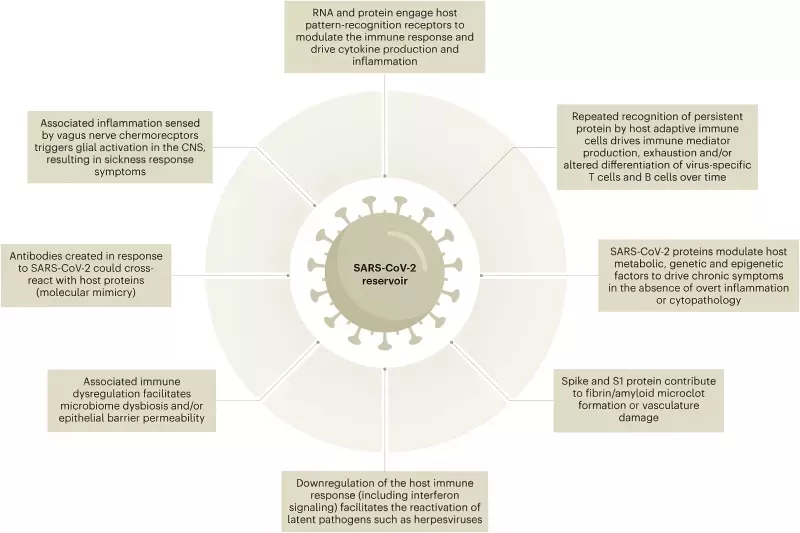
Updated 2023/09/14.
Since the SARS-CoV-2 pandemic began, the default assumption has been that the immune system is capable of fully clearing the virus from the body. Even in March of this year, a study in Signal Transduction and Targeted Cell Therapy by researchers in Guangdong — referring to clearance — demonstrated that asymptomatic patients stopped shedding detectable amounts of RNA after being given an adenovirus-vector vaccine. This is not the same as actual clearance, however, since viruses are capable of persisting and replicating intracellularly.
There are known unknowns with regard to asymptomatic infections. A recent review in Nature Immunology — which primarily concerns viral reservoirs in patients with clinical PASC/long covid — includes a sentence that more research is needed on reservoirs in asymptomatic patients:
Factors that differentiate SARS-CoV-2 persistence in PASC from persistence in asymptomatic individuals should be explored.
Referenced is a preprint from researchers at the University of California San Francisco, who observed the continual activation of T cells in patients assumed to have recovered. Due to the absence of evidence that SARS-CoV-2 fully clears the body, they note that further research is needed:
Further investigation, including assessment of fully recovered comparators, will be needed to determine whether persistence is clearly associated with Long COVID or occurs even in those who are believed to have fully recovered.
[...] All but one participant had received at least one COVID-19 vaccination prior to PET imaging (median number of days from the most recent vaccine dose to tracer injection was 183 days).
The Nature Immunology review also referenced an NIH autopsy study — published in Nature on December 14, 2022 — which found replication-evident SARS-CoV-2 all over the body, and included the following clarification:
Our cohort is predominantly composed of severe and ultimately fatal COVID-19 cases. However, two cases (P36 and P42) reported only mild or no respiratory symptoms and died with, not from, COVID-19, yet had SARS-CoV-2 RNA widely detected across the body and brain.
Furthermore, a study in PNAS by researchers at Ohio State Univerisity found in vitro evidence that SARS-CoV-2 is capable of spreading directly from target cell to target cell, bypassing extracellular fluid and humoral immunity — the very recipe for persistence.
Together, these facts imply a pretty dismal picture:
- Full viral clearance has never been demonstrated with SARS-CoV-2, regardless of vaccination status.
- Evidence of asymptomatic persistence has been demonstrated both in vivo and post-mortem.
- Persistence appears to be the rule, not the exception.
- Reservoirs in the body enable a subclinical form of long covid, which might progress toward a clinical form through various mechanisms.
Update:
On September 14, The John Snow Project further clarified this outlook in a piece titled COVID-19: A NEW DISEASE PARADIGM:
COVID-19 is a disease that has an acute and chronic phase. Both phases can be asymptomatic or symptomatic, and the severity and nature of symptoms in either phase depends on the host immune response, viral inoculum and location of infection. In the chronic phase, commonly known as Long COVID, many more people than those who exhibit symptoms of Long COVID, or perhaps everyone who has been infected by COVID-19, is on the same spectrum of T cell activation and may share as yet undiscovered characteristics of viral persistence or immune dysfunction [...], and the experience of those symptoms, which may be associated with further immune perturbation on reinfection, may be related to the location and/or quantity of viral RNA/protein/replicating virus in persistent reservoirs.
References:
- Signal Transduction and Targeted Cell Therapy – Successful clearance of persistent SARS-CoV-2 asymptomatic infection following a single dose of Ad5-nCoV vaccine
- Nature Immunology – SARS-CoV-2 reservoir in post-acute sequelae of COVID-19 (PASC)
- Division of HIV, Infectious Diseases, and Global Medicine, UCSF (preprint via medRxiv) – Multimodal Molecular Imaging Reveals Tissue-Based T Cell Activation and Viral RNA Persistence for Up to 2 Years Following COVID-19
- Nature – SARS-CoV-2 infection and persistence in the human body and brain at autopsy
- PNAS – SARS-CoV-2 spreads through cell-to-cell transmission
- The John Snow Project – COVID-19: A NEW DISEASE PARADIGM
